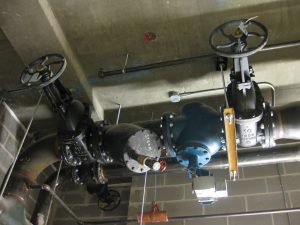5 Types of Plumbers and Their Duties and Salary
Plumbing jobs are in high demand thanks to the regular construction of new buildings and homes. Depending on the type of plumber, individuals can make a substantial salary and gradually increase that salary as experience and knowledge are gained. In this article, we’ll explain the basic duties of a plumber, the average salary for plumbers in the United States, the different types of plumbers and how to increase your salary in this job.
What are the duties of a plumber?
Plumbers are construction professionals who repair and install various types of pipes that carry water and gas to and from a location. They also handle fixtures that take waste away from businesses and individual homes. Common appliances that a plumber works with include sinks, toilets, washing machines, bathtubs, showers and dishwashers. More experienced plumbers often allow less experienced plumbers to work as apprentices for them to receive on-the-job training.
Common duties of a plumber include:
- Installing plumbing fixtures and water and gas pipes
- Inspecting and testing plumbing equipment like pressure gauges to ensure they work correctly
- Troubleshooting plumbing fixtures and make corrections when needed
- Getting rid of obstructions in toilets and drains
- Providing clients with estimated costs of plumbing services
- Repairing plumbing fixtures and pipes
Related: How To Become a Plumber
Average salary for a plumber
Plumbers working in the United States make an average of $50,602 per year. They also make around $6,750 in overtime per year. These numbers are based on 10,800 salaries reported to Indeed as of December 26, 2020. Several factors influence the salary a plumber makes, including how much experience the plumber has, where they work and their geographical location. For the most up-to-date information from Indeed, please click on the salary link above.
In addition to salary, some plumbers also enjoy benefits. Common benefits offered to plumbers include:
- Food provided
- Paid time off
- Tuition reimbursement
- Flexible schedule
- Life insurance
- Health insurance
- Dental insurance
- Vision insurance
- Parental leave
- Professional development assistance
- 401(k) plans
- Disability insurance
Benefits will vary depending on a plumber’s place of employment.
Read more: A Guide To Plumbing Salaries
5 different types of plumbers
There are a few different types of plumbers. Knowing these types and what they do can help you decide what kind of plumber you want to be. The primary types of plumbers include:
Commercial plumber
Commercial plumbers are qualified professionals who perform plumbing duties in commercial settings. Many commercial plumbers work in schools, hospitals, colleges and manufacturing plants and specialize in working around industrial equipment. This type of plumber is responsible for installing, maintaining and repairing tanks and pipes in these commercial settings.
Commercial plumbers are experts in working with large amounts of outlets and pipes as well as working on multiple floors. This differs from residential plumbers who are mainly hired to work on one or two plumbing fixtures in a single home. Commercial plumbers can also handle a wide variety of issues and must stay up-to-date on codes related to plumbing in a commercial setting.
This type of plumber often deals with a number of issues in commercial buildings, such as removing large amounts of waste and installing water systems for large businesses. Their responsibilities are typically much more extensive than that of a residential plumber. As a result, commercial plumbers are often much more advanced and knowledgeable about various plumbing issues than residential plumbers.
Service and repair plumber
Service and repair plumbers specialize in performing various maintenance and repair tasks related to plumbing systems in both residential and commercial settings. This type of plumber usually gains their experience through technical training as well as on-the-job training. Common jobs a service and repair plumber may perform include fixing leaks, adjusting reduced pressure, eliminating clogs and cleaning plumbing systems and fixtures.
Residential plumber
Residential plumbers specialize in installing, maintaining and repairing plumbing fixtures and issues in a residential setting. Residential plumbers spend much of their time performing pipe system installations, small-scale plumbing jobs and residential plumbing system repairs. They work with plumbing systems such as pipes, water systems and toilets and can typically solve any plumbing-related issues within a home.
Residential plumbers often gain their expertise and experience by working as an apprentice under a more experienced plumber. Once they are skilled in their profession, these plumbers can work independently or for a company as an independent plumber.
Sanitary plumber
A sanitary plumber is a plumbing professional who specializes in various plumbing techniques related to sanitary systems. This is the most common type of plumber hired as most residential plumbing issues relate to the home’s sanitary system. Common tasks performed by sanitary plumbers include unblocking and cleaning jams in sanitary systems, installing toilet and bathroom pipes, fitting suspended drains and overseeing plumbing installations like bathtubs and toilets. Sanitary plumbers may also fit water heating systems and boilers in showers and toilets.
Water supply plumber
Water supply plumbers specialize in working with water supply systems such as water tanks, kitchen tanks, bathroom tanks, overhead storage tanks and pipes. Common duties of water supply plumbers include installing various water supply systems in bathrooms, kitchens and laundry rooms as well as fitting excess pipes and sanitation systems. Some water supply plumbers will also perform basic residential plumbing duties like unclogging kitchen and bathroom drains and toilets.
Related: Plumber Resume Template: How To Create a Plumber Resume with Examples
Ways to increase your salary as a plumber
The following are a few methods you can try to increase your salary as a plumber:
- Get more experience. The more experience you have, the more you’ll likely get paid as a plumber. Plumbers just starting out typically make around $20,000 to $40,000 less per year than those with 10 or more years of experience.
- Change your industry. The industry a plumber works in can play a significant role in how much they make on an annual basis. For example, plumbers who work in the construction industry often make more money than those who work in the hospitality or manufacturing industries.
- Change the company you work for. A plumber’s salary is also based on their place of employment. If you want to make more money as a plumber, do some research on available plumbing jobs and the average salary of plumbers at each company.
- Consider moving to a different location. How much a plumber makes is also impacted by their geographical location. For example, plumbers working in Brooklyn, NY, make around $61,805 per year, while those working in Houston, TX, make an average of $47,093 per year.
- Pursue a master plumber certification. Once you’ve gained enough experience as a plumber, you can pursue the title of master plumber. This certification requires you to possess a license as a journeyman plumber, work as a journeyman plumber for two to five years and then take the state exam for the master plumber certification. Master plumbers can work as project managers or open their own plumbing business, both of which can substantially increase their earnings.





